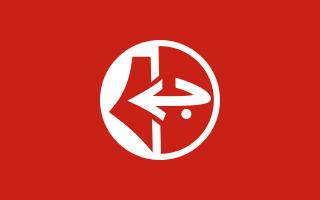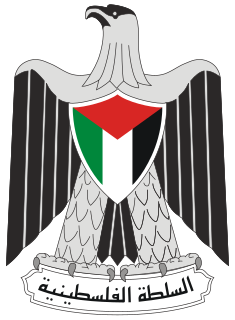Related Research Articles

Fatah, formerly the Palestinian National Liberation Movement, is a Palestinian nationalist social democratic political party and the largest faction of the confederated multi-party Palestine Liberation Organization (PLO) and the second-largest party in the Palestinian Legislative Council (PLC). The President of the Palestinian Authority is a member of Fatah.

The Palestinian National Authority is the interim self-government body established in 1994 following the Gaza–Jericho Agreement to govern the Gaza Strip and Areas A and B of the West Bank, as a consequence of the 1993 Oslo Accords. Following elections in 2006 and the subsequent Gaza conflict between the Fatah and Hamas parties, its authority had extended only in areas A and B of the West Bank. Since January 2013, the Fatah-controlled Palestinian Authority uses the name "State of Palestine" on official documents.

The Palestine Liberation Organization is an organization founded in 1964 with the purpose of the "liberation of Palestine" through armed struggle, with much of its violence aimed at Israeli civilians. It is recognized as the "sole legitimate representative of the Palestinian people" by over 100 states with which it holds diplomatic relations, and has enjoyed observer status at the United Nations since 1974. The PLO was considered by the United States and Israel to be a terrorist organization until the Madrid Conference in 1991. In 1993, the PLO recognized Israel's right to exist in peace, accepted UN Security Council resolutions 242 and 338, and rejected "violence and terrorism". In response, Israel officially recognized the PLO as the representative of the Palestinian people. However, the PLO has employed violence in the years since 1993, particularly during the 2000–2005 Second Intifada. On 29 October 2018, the Palestinian Central Council suspended the recognition of Israel and halted security and economic coordination in all its forms with it.

The Palestinian government is the government of the Palestinian Authority or State of Palestine. The Executive Committee of the Palestine Liberation Organization (EC) is the highest executive body of the Palestine Liberation Organization and acts as the government. Since June 2007, there have been two separate administrations in Palestine, one in the West Bank and the other in the Gaza Strip. The government on the West Bank was generally recognised as the Palestinian Authority Government. On the other hand, the government in the Gaza Strip claimed to be the legitimate government of the Palestinian Authority. Until June 2014, when the Palestinian Unity Government was formed, the government in the West Bank was the Fatah-dominated Palestinian government of 2013. In the Gaza Strip the government was the Hamas government of 2012. Following two Fatah–Hamas Agreements in 2014, on 25 September 2014 Hamas agreed to let the PA Government resume control over the Gaza Strip and its border crossings with Egypt and Israel, but that agreement had broken down by June 2015, after President Abbas said the PA government was unable to operate in the Gaza Strip.

Palestinian political violence refers to acts of violence or terror motivated by Palestinian nationalism. These political objectives include self-determination in and sovereignty over Palestine, the "liberation of Palestine" and recognition of a Palestinian state, either in place of both Israel and the Palestinian territories, or solely in the Palestinian territories. Periodically directed toward more limited goals such as the release of Palestinian prisoners in Israel, another key aim is to advance the Palestinian right of return.

The Palestinian Democratic Union, generally known as FIDA is a small Palestinian political party active in the Palestine Liberation Organization (PLO) and the Palestinian National Authority (PNA).

The Prisoners' Document, officially the National Conciliation Document was written in May 2006 by Palestinian prisoners, who were being held in an Israeli jail. The five prisoners who took part in writing the Document were respectively affiliated with Fatah, Hamas, Islamic Jihad, the Popular Front for the Liberation of Palestine (PFLP), and the Democratic Front for the Liberation of Palestine (DFLP).

The Palestinian National Security Forces are the paramilitary security forces of the Palestinian National Authority. The name may either refer to all National Security Forces, including some special services but not including the Interior Security Forces, the Presidential Guard and General Intelligence, or refer to the main force within the National Security Forces.

Human rights in the State of Palestine refers to the human rights record in the West Bank and Gaza.

The Palestinian Authority Government of June 2002 was a government of the Palestinian National Authority (PA) from June to September 2002, headed by Yasser Arafat, the President of the Palestinian National Authority.

The prime minister of the Palestinian National Authority was the position of the official head of government of the Palestinian Authority government, which operated between 2003 and January 2013, when it was officially transformed into the State of Palestine. Some still refer to the position of the prime minister of the Gaza Strip as the prime minister of the Palestinian National Authority.

The Popular Front for the Liberation of Palestine (PFLP) is a secular Palestinian Marxist–Leninist and revolutionary socialist organization founded in 1967 by George Habash. It has consistently been the second-largest of the groups forming the Palestine Liberation Organization, the largest being Fatah.

The Palestinian Legislative Council (PLC) is the unicameral legislature of the Palestinian Authority, elected by the Palestinian residents of the Palestinian territories of the West Bank and Gaza Strip. It currently comprises 132 members, elected from 16 electoral districts of the Palestinian Authority. The PLC has a quorum requirement of two-thirds, and since 2006 Hamas and Hamas-affiliated members have held 74 of the 132 seats in the PLC. The PLC's activity has been suspended in 2007 and remains so as of 2020, with the President issuing laws by decree, while PLC committees continue working at a low rate and parliamentary panel discussions are still occurring.

The Democratic Front for the Liberation of Palestine is a Palestinian Marxist–Leninist–Maoist, secular political and militant organization. It is also frequently referred to as the Democratic Front, or al-Jabha al-Dimuqratiyah. It is a member organization of the Palestine Liberation Organization the Alliance of Palestinian Forces and the Democratic Alliance List.
The Battle of Gaza, also referred to as Hamas' takeover of Gaza, was a military conflict between Fatah and Hamas, that took place in the Gaza Strip between June 10 and 15, 2007. It was a prominent event in the Fatah–Hamas conflict, centered on the struggle for power, after Fatah lost the parliamentary elections of 2006. Hamas fighters took control of the Gaza Strip and removed Fatah officials. The battle resulted in the dissolution of the unity government and the de facto division of the Palestinian territories into two entities, the West Bank governed by the Palestinian National Authority, and Gaza governed by Hamas.

The Palestinian National Covenant or Palestinian National Charter is the covenant or charter of the Palestine Liberation Organization (PLO). The Covenant is an ideological paper, written in the early days of the PLO.

The Fatah–Hamas reconciliation process refers to a series of reconciliation attempts to resolve the hostility between Fatah and Hamas since the 2006–2007 Fatah–Hamas conflict and Hamas' subsequent takeover of the Gaza Strip.
The Palestinian Cairo Declaration was a declaration signed on 19 March 2005 by twelve Palestinian factions, including Fatah, Hamas, Islamic Jihad, Popular Front for the Liberation of Palestine (PFLP) and Democratic Front for the Liberation of Palestine (DFLP). The Cairo Declaration reaffirmed the status of the Palestine Liberation Organization (PLO) as the sole legitimate representative of the Palestinian people through the participation in it of all forces and factions according to democratic principles. The Declaration implied a reform of the PLO by the inclusion in the PLO of Hamas and Islamic Jihad.

The Palestinian Authority Government of April 2003 was a government of the Palestinian National Authority (PA) from 29 April to 6 September 2003. It was headed by Mahmoud Abbas, the first PA Prime Minister. The Prime Minister and his government were approved by the Palestinian Legislative Council on 29 April.
The Palestinian cabinet, headed by Prime Minister Rami Hamdallah, announced on 23 June 2016 a decision to hold municipal elections on 8 October 2016. The elections were suspended by the Palestinian Court in early September and in January 2017 they were set to 13 May 2017. They were expected to be the first elections in all of the Palestinian territories since Hamas' takeover of the Gaza Strip in 2007, as Hamas agreed to participate in the local elections and allow them to be held in the Gaza Strip but disagreements between Hamas and Fatah led to Hamas boycotting stating it will participate only after "ending disagreements, achieving reconciliation, and uniting Palestinian institutions, including at the political, judicial, and security levels". The elections were later slated to be held in West Bank in May 2017 and were postponed in Gaza Strip.
References
- ↑ Ministry of Information
- ↑ June - October 2002 Archived 2003-12-15 at the Wayback Machine Jerusalem Media and Communications Centre.
| This article about a Palestinian politician is a stub. You can help Wikipedia by expanding it. |